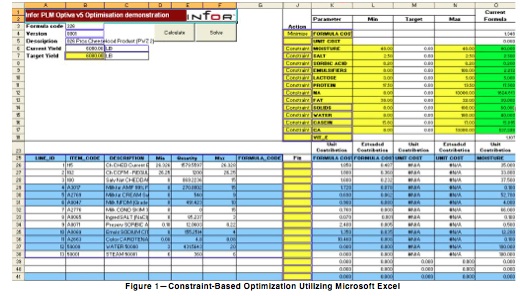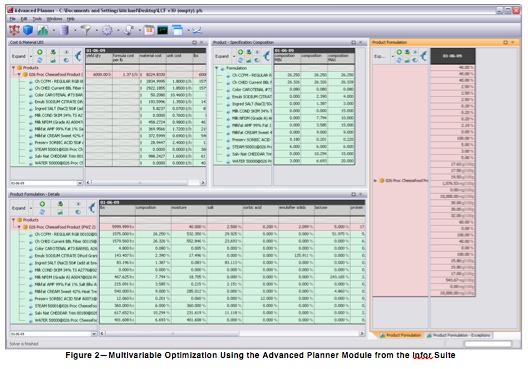Optimizing Product Cost by Leveraging Infor10 PLM Process (Optiva)
 In today’s fast-paced world, controlling product cost and getting to market on time are keys to business success. If you cannot deliver quality products profitably you will not stay in business. In the highly competitive food and beverage industry, formulated products range in price from less than a dollar to a few dollars. When you think about the cost of the package, the weight of the product, and the transportation and handling costs to get it from the factory to your grocery bag, it’s hard to imagine there is room for any of the formulated product cost. Those costs include the people to define, plan, and manufacture the product; the factories and production equipment; the cost of raw materials and purchased ingredients; and the processing of the raw materials and ingredients to convert them into finished products.
In today’s fast-paced world, controlling product cost and getting to market on time are keys to business success. If you cannot deliver quality products profitably you will not stay in business. In the highly competitive food and beverage industry, formulated products range in price from less than a dollar to a few dollars. When you think about the cost of the package, the weight of the product, and the transportation and handling costs to get it from the factory to your grocery bag, it’s hard to imagine there is room for any of the formulated product cost. Those costs include the people to define, plan, and manufacture the product; the factories and production equipment; the cost of raw materials and purchased ingredients; and the processing of the raw materials and ingredients to convert them into finished products.
Food and beverage products are primarily based on agricultural commodities prices, which fluctuate based on supply and demand in real-time. Commodity price variations can be induced by the season, weather, natural disaster, or demand variation. Demand variation can be due to new applications for the commodity that would increase the demand, or possibly a substitute product that could decrease the demand, for the original commodity. Food and beverage manufacturers need to assess their product formulations and recipes continually, to ensure that business targets are met while meeting customer and regulatory requirements, in order to maintain product quality and profit margins.
Product lifecycle management (PLM) tools help manufacturers develop new products that meet quality, cost, and time-to-market requirements, and of course meet customer requirements. PLM tools also help control costs by providing visibility to the current as-designed cost. In order to accurately roll up as-designed costs, best-in-class companies integrate PLM with enterprise resource planning (ERP), enabling the PLM to have up-to-date, accurate cost data for items such as raw materials, ingredients, and packaging. This cost data can be used to roll up the as-designed product cost. Effective cost management is critical to maintaining profit margins in the competitive food and beverage industry. Additionally, PLM tools support time to market, by efficiently managing product data and processes to ensure that the right data gets to the right people at the right time.
Infor10 PLM Process (Optiva) is a proven PLM system widely used in the food and beverage industry. It includes capabilities to design for cost including tools to help optimize formulation costs over time in order to manage margin erosion due to commodity price changes.
The core data in the process industry is the recipe or formula. At a high level, the formula contains a list of ingredients and processing instructions that are used to produce a product. Additional high-level information that defines the product includes packaging, artwork, and labeling. Infor10 PLM Process (Optiva) manages the relationships between these information items to ensure they stay in sync. The items contain typical PLM metadata, such as owner, status, cost, and revision level, as well as other process-related attributes, and alternate or substitute items. Ensuring that the relationships among all the product definition data are accurate minimizes uncertainty and risk allowing a faster time to market.
In order to support basic design for cost, two primary use cases are supported; “create from scratch” and “modify existing.” In the create-from-scratch scenario, the formulator creates a new formula by selecting ingredients and processes, and possibly standard sub-formulas. As long as the cost attributes are populated, Infor10 PLM Process (Optiva) will calculate the rolled-up cost for the new formula. The formulator will then evaluate the cost factors and adjust the formula as required.
The second use case involves modifying an existing formula. If an existing product is identified as having margin issues, the decision may be made to reformulate it to reduce cost, in order to improve the margin. When reviewing the formula, the current total cost as well as the cost of each item within the formula is displayed. Ingredient quantities can be adjusted and the product targets recalculated. If the cost target cannot be met, Infor10 PLM Process (Optiva) supports the definition of alternate items that can be substituted. Substitution of an alternate item in a formula will automatically calculate the new cost that hopefully meets the target. The change may be for a replacement ingredient, e.g., when in-season tomatoes from Florida are cheaper than tomatoes from California, or, when a different production line has a lower operating cost.
In either use case Infor10 PLM Process (Optiva) will revalidate the formula for regulatory requirements and claims, and ensure that the ingredients list and nutritional labels are updated and accurate. This allows launches to happen sooner and with a higher quality. Faster validation of formulas provides more opportunity to respond to changes in raw material and ingredient costs, and thus to increase profit margins.
Infor10 PLM Process (Optiva) also supports single-variable optimization using Microsoft Excel as the calculation engine. It formats an Excel spreadsheet (Figure 1) that uses the formula, including parameter ranges for constraints, to optimize the formula for a single variable like cost, or a calculated value like cholesterol. This capability is included within the base Infor 10 PLM product.

In addition to the single-variable optimizer, Infor also has a tool that calculates least-cost formulation using multi-variable optimization. Infor has a broad product line that includes ERP, SCM, CRM, PLM, and many industry-specific tools, and is able to leverage technology across them. Within the supply chain management (SCM) application there is an Advanced Planning tool that contains a multi-variable optimizer. Its purpose is to efficiently find the right combination of values that achieve a target result. It is typically used to optimize production and logistics processes. Infor has integrated this tool (Figure 2) with Infor10 PLM Process (Optiva) so the optimizer recognizes and understands the product formula. The tool will then adjust the formula to optimize it against multiple variables like cost, cholesterol content, and salt content. This is done while ensuring that claims and regulatory validity are maintained. This optimization process makes it easy to optimize the product cost from the conceptual stage, through design for manufacturing, and into production.

Food and beverage manufacturers face tremendous pressure from health- and price-conscious consumers, profit-conscious investors, extremely price-conscious retailers, and from food-safety initiatives imposed by regulatory bodies like the FDA. All these stakeholders are squeezing margins. Least Cost Formulation from Infor can be used during product development as a core tool to optimize formulations and recipes. It supports single- and multiple-variable optimizations. In both scenarios ingredient parameters as well as calculated outputs can be used as constraints. Running optimizations early in the R&D process allows optimal products to be developed faster. Since the optimization takes place within the Infor10 PLM Process (Optiva) environment, the integrated regulatory compliance checks and labeling output are validated quickly, enabling a faster product launch. Even a small-percentage improvement in margin gained by incremental cost reductions and faster, higher quality launches can have a significant impact on the overall profitability of the company.
About CIMdata
CIMdata, an independent worldwide firm, provides strategic management consulting to maximize an enterprise’s ability to design and deliver innovative products and services through the application of Product Lifecycle Management (PLM). CIMdata provides world-class knowledge, expertise, and best-practice methods on PLM. CIMdata also offers research, subscription services, publications, and education through international conferences. To learn more about CIMdata’s services, visit our website at http://www.CIMdata.com or contact CIMdata at: 3909 Research Park Drive, Ann Arbor, MI 48108, USA. Tel: +1 734.668.9922. Fax: +1 734.668.1957; or at Oogststraat 20, 6004 CV Weert, The Netherlands. Tel: +31 (0) 495.533.666










